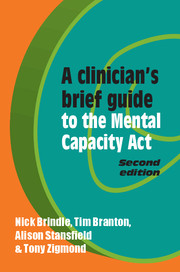Book contents
- Frontmatter
- Contents
- Preface
- Preface to the second edition
- Common abbreviations and terms
- 1 The legal framework: the Mental Capacity Act, the Human Rights Act and common law
- 2 The Mental Capacity Act and the authority to treat
- 3 Assessment of capacity
- 4 Best interests
- 5 Alternative authority – planning for the future
- 6 Independent Mental Capacity Advocates and regulation of research
- 7 Deprivation of Liberty Safeguards
- 8 The Court of Protection, clinically relevant judgments from the courts and writing reports
- 9 The Mental Health Act
- References
- Index
3 - Assessment of capacity
Published online by Cambridge University Press: 01 January 2018
- Frontmatter
- Contents
- Preface
- Preface to the second edition
- Common abbreviations and terms
- 1 The legal framework: the Mental Capacity Act, the Human Rights Act and common law
- 2 The Mental Capacity Act and the authority to treat
- 3 Assessment of capacity
- 4 Best interests
- 5 Alternative authority – planning for the future
- 6 Independent Mental Capacity Advocates and regulation of research
- 7 Deprivation of Liberty Safeguards
- 8 The Court of Protection, clinically relevant judgments from the courts and writing reports
- 9 The Mental Health Act
- References
- Index
Summary
Making decisions is a fundamental part of everyday life. Decision making is affected by a complex combination of factors that vary between individuals and depend, for example, on beliefs and values that in turn are influenced by society, culture, education and pressure from family and peer groups. Understanding how an individual reaches a decision can be extremely difficult.
Despite this complexity, accurate assessment of decision-making capacity is the first aspect in the process of consent and is often crucial in the preservation of autonomy and self-determination. Studies have estimated that 29% of psychiatric in-patients and 40% of acutely ill medical in-patients lack capacity. This indicates that decision-making incapacity is both common and probably under-recognised. In extreme cases, for instance in impaired consciousness or more severe states of confusion, the degree of incapacity may be obvious; notwithstanding, practitioners must remain attentive to the principles of the MCA. In many cases where capacity is borderline, its assessment may require more careful and rigorous examination, including the application and interpretation of specific ‘tests’ or legal standards.
It is also important to be aware that decision-making capacity is not an all or nothing phenomenon. A person may be able to consent to a relatively straightforward medical or other intervention, but lack capacity to consent to something more complex. Furthermore, although the principle is to interfere as little as possible with autonomous decision-making, the degree of disability required to classify someone as lacking capacity varies in proportion to the gravity of the decision to be made. That is, the threshold for determining that a person lacks capacity depends, in part, on the consequences of the decision and resulting harm to that person. This may make it very difficult for carers to decide whether a person has capacity to make an albeit unwise decision, or lacks capacity. For example, a person with a learning disability may be permitted to eat high-fat or high-sugar foods occasionally. But what if carers regularly allow this behaviour, causing excessive weight gain and serious comorbid physical illnesses? The risks become much graver.
- Type
- Chapter
- Information
- A Clinician's Brief Guide to the Mental Capacity Act , pp. 30 - 42Publisher: Royal College of PsychiatristsPrint publication year: 2015



